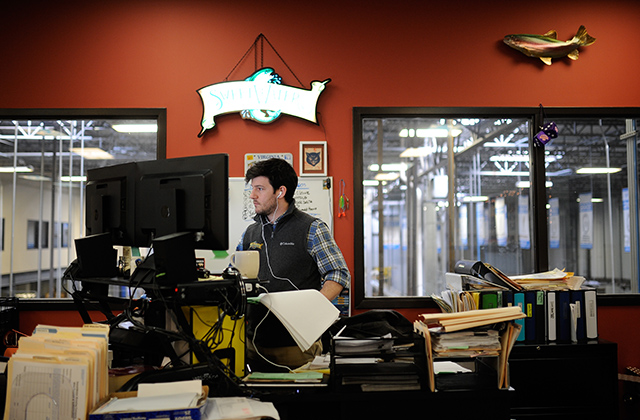
The secret ingredient to success isn’t just found in the quality of the liquid; it starts deep by creating a strong culture thriving within the brewery walls. As establishments mature and staff numbers swell, the importance of creating well-defined SOPs for company culture becomes increasingly clear.
From employee handbooks to weekly meetings with managers, creating a culture may start at the top but it needs every employee’s involvement. The collective sentiment is clear – creating a thriving culture involves deliberate efforts, documented values, and living documents.
“The first priority is to define your culture,” pointed out Reuben’s Brews founder Adam Robbings. “It needs to be written down, so there’s no confusion.”
The veteran Seattle brewery has its values defined and written down and listed on its website. The same holds true for Olde Mecklenburg Brewery.
“We have core values and they’re really important as far as everything that we do; from hiring to promotion to community involvement,” said OMB COO Jim Birch. It’s been especially important for the Charlotte company to define those as it plans to open a new Biergarten and restaurant this spring. Birch added that employees nowadays — and more so than ever — are looking for more than just a job and more than just a paycheck.
“They’re looking to work somewhere where their values align with the company’s values,” he said. “We don’t wade into politics, we don’t try to get political or go into areas that are too divisive but we do want to be more than just a place that you work at.
“We actually asked our managerial candidates to pick a core value, and then to describe for us, sort of a time when they’ve either lived that or think that it’s important and we get really great responses.”
Joe Short, founder of Short’s Brewing, believes in leading by example to shape the brewery’s culture.
“At the end of the day, it’s just food and beer, so we try to have a good time,” Short said, but with 150 employees, Short’s maintains standards through guidelines for acceptable behavior and policies covering various aspects such as shift protocols, health and wellness, and remote work.
The importance of creating living documents becomes evident in managing expectations.
“The standardization helps when people join the team. It all comes back to managing expectations,” Short said. Having had in-house HR since 2010, Short recognizes the essential role of human resources in running a successful operation.
“Humans are an essential resource, so just as important as having someone run finances and production,” he said. “We needed someone to help with our people.”
Alchemist goes beyond typical handbooks, opting to invest in team education, including implicit bias and neurodiversity training, explained co-founder Jen Kimmich. Alchemist’s handbook mirrors these values, focusing on how employees should treat each other and how management responds to employee issues and customer interactions. It’s not just about the written word but about fostering an inclusive environment that respects everyone.
“We don’t want a great brewer who does not share our commitment to inclusivity or sustainability,” she explained. “The biggest step towards building an inclusive and healthy workplace starts with the interviewing process. Are you hiring a person who shares your values and is ready to be welcoming to all?”
READ MORE: Crafting a Brewery Culture Future with In-house HR or Services
Since founding New Realm, fostering a culture of transparency, integrity, and equality remains a vital part of the Georgia and Virginia brewery’s mission. In support of that mission, CEO Carey Falcone explained they have undertaken several initiatives over the last several years, including ongoing training at all levels of the organization to ensure they maintain a safe and inclusive workplace, improving the means through which employees can anonymously report workplace concerns through a third party, and the establishment of a diversity council that is focused on ensuring that New Realm remains an inclusive, inviting, and a great place to work.
“Our handbook clearly addresses how to report any behavior, actions, or conversations that an employee deems inappropriate or disrespectful,” Falcone said. “This consistency of message and unity of purpose gives us a solid platform for common understanding and practice as our team grows.”
Robbings underscored the importance of defining and documenting company culture in print and online. Reuben’s Brews has its values clearly defined and accessible on its website and the brewery operates on the Entrepreneurial Operating System (EOS), which aids in values-based hiring and performance management.
The employee handbook at Reuben’s Brews integrates values into hiring, annual performance appraisals, quarterly check-ins, and a performance improvement process, all aligned with the established values set. Robbings notes the importance of having these living documents as the brewery grows, emphasizing EOS as a tool to kick-start such initiatives.
New Realm employs a “best idea wins” philosophy, and Falcone said that they work hard to create a culture that invites all team members, regardless of tenure or role, to communicate courageously.
“Coupling this philosophy with our efforts to ensure that our leadership’s focus is on supporting our team’s growth and development means that we are constantly striving for perfection in everything we do,” Falcone said.
The brewery’s core values and core behaviors of potential employees come out in their interview process.
“Questions are tailored around the values, and they are discussed throughout all stages of the interview process,” he said.
Every business is a work in progress and even when replying to questions regarding standardizing their culture SOPs, Director of Operations of Boomtown, Samuel Chawinga said that after reading some questions posed to him, they will be working on creating these parts in the employee handbook.
“Revisiting documents is a major part of being successful,” Chawinga said. “If as a business you are not changing to keep pace with life, it will pass you by and you will no longer be in business.”
Starting as a small team, the culture was a close-knit, hard-working family at Boomtown.
“While we have grown the family, the aspect has changed more to a respect for people’s work, who they are, and what they add to the team,” Chawinga said. “When you are smaller the personal issues that arise are easier to deal with because they involve fewer people.
“Although it is nice when it happens, I don’t need every person in the team to like all the other members. What we do require is respect of our fellow team members and the appreciation that we are all working toward the same goal.”






Be the first to comment